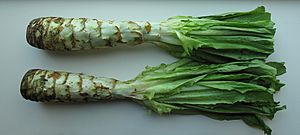Celtuce facts for kids
Quick facts for kids Celtuce |
|
|---|---|

Celtuce stems and heads
|
|
| Species | Lactuca sativa var. augustana |
| Cultivar | 'Celtuce' |
| Origin | Mediterranean region |
| Nutritional value per 100 g (3.5 oz) | |
|---|---|
| Energy | 75 kJ (18 kcal) |
|
3.65 g
|
|
| Dietary fiber | 1.7 g |
|
0.3 g
|
|
|
Protein
|
0.85 g
|
| Vitamins | Quantity
%DV†
|
| Vitamin A equiv. |
22%
175 μg |
| Thiamine (B1) |
5%
0.055 mg |
| Riboflavin (B2) |
6%
0.07 mg |
| Niacin (B3) |
3%
0.55 mg |
| Pantothenic acid (B5) |
4%
0.183 mg |
| Vitamin B6 |
4%
0.05 mg |
| Folate (B9) |
12%
46 μg |
| Vitamin C |
23%
19.5 mg |
| Minerals | Quantity
%DV†
|
| Calcium |
4%
39 mg |
| Iron |
4%
0.55 mg |
| Magnesium |
8%
28 mg |
| Manganese |
33%
0.688 mg |
| Phosphorus |
6%
39 mg |
| Potassium |
11%
330 mg |
| Sodium |
1%
11 mg |
| Zinc |
3%
0.27 mg |
|
Link to USDA Database entry
|
|
| †Percentages estimated using US recommendations for adults. | |
Celtuce is a special type of lettuce. It is grown mainly for its thick stem, but its leaves can also be eaten. People also call it stem lettuce, celery lettuce, asparagus lettuce, or Chinese lettuce.
In China, it is very popular. The stem is often called wosun or qingsun. The leaves are known as youmaicai.
Contents
What is Celtuce?
Celtuce is a unique vegetable. It has pale green leaves and white stems. Both parts can be eaten raw, like in salads. You can also cook them. Celtuce can be pickled, grilled, roasted, or stir-fried.
It has a mild, nutty taste. Some people notice a slight smoky flavor after eating it. Celtuce is also packed with healthy vitamins.
Where Does Celtuce Come From?
Most people believe Celtuce first came from the Mediterranean area. This region is around the Mediterranean Sea. It was then brought to China a long time ago. This happened during the Tang Dynasty, which was between the years 600 and 900 AD.
How to Grow Celtuce
You can grow Celtuce from seeds. In the Northern Hemisphere, seeds are usually planted from April to May. You can plant them directly in a garden bed. Or, you can start them in a small nursery bed. Later, you move them to their final growing spot.
Each plant should be about 30 centimeters (about 1 foot) apart. The young leaves are ready to eat about 4 to 5 weeks after planting. The stems are ready when they are about 30 centimeters tall. They are usually harvested between July and September.
Sometimes, tiny insects called aphids might attack the plant.
How to Enjoy Celtuce
The stem of Celtuce is usually harvested when it is about 15 to 20 centimeters (6-8 inches) long. It is also about 3 to 4 centimeters (1-1.5 inches) thick. The stem is crisp, moist, and has a mild flavor.
People often prepare it by slicing it into pieces. Then, they stir-fry it with other ingredients that have stronger flavors.
See also
 In Spanish: Lechuga china para niños
In Spanish: Lechuga china para niños
 | Leon Lynch |
 | Milton P. Webster |
 | Ferdinand Smith |

